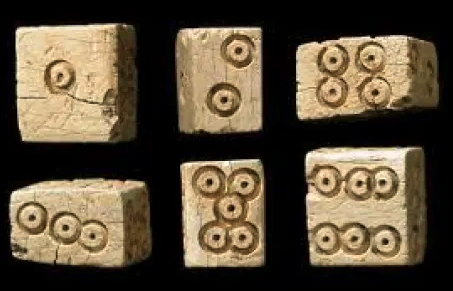Cleromancy
Cleromancy is a form of sortition (casting of lots) in which an outcome is determined by means that normally would be considered random, such as the rolling of dice, but that are sometimes believed to reveal the will of a deity.
Techniques for cleromancy are contained in specialized grimoires known as lot books.
Origins
Many cultures around the world have used casting lots as a form of divination since ancient times, and there is no single established tradition for the practice.
In 98 AD, Tactus described the Germanic practice of casting lots through the use of wooden runes with symbols carved upon them.
In China, the I Ching descended in part from the oracle bone divination system and grew over time into a rich literary wisdom tradition that was closely tied to the philosophy of yin and yang. I Ching practice is widespread throughout East Asia, and commonly involves the use of coins or sticks of yarrow.
Use in the Bible
The Urim and Thummim were a form of oracle used to make decisions by the Hebrew High Priest, although there is considerable scholarly debate concerning their actual function and methodology.
Casting of lots is mentioned 47 times in the Bible. Some examples in the Bible of the casting of lots as a means of determining God's will include:
- Leviticus 16:8 - to determine the scapegoat for Azazel.
- Numbers 26:55 - allocating land for the tribes of Israel.
- Samuel 14:42 - to determine the guilt of Saul's son.
- Jonah 1:7 - the sailors determine which god has forsaken them.
- Proverbs 16:33 - encouraging the casting of lots to settle disputes.
- Psalms 22:18 - regarded by Christians as a prophecy concerning Jesus Christ.
- Acts 1:23–26 - the Apostles cast lots to determine who will replace Judas.
